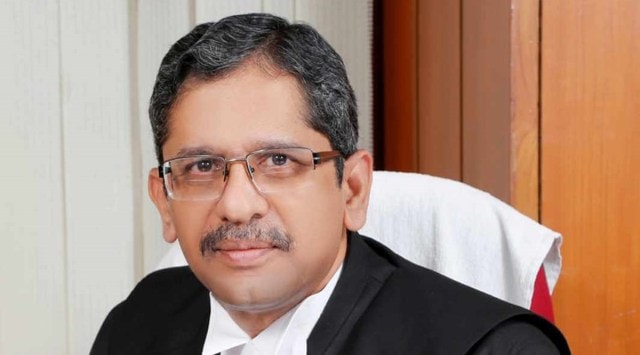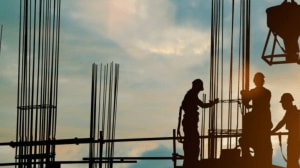WITH ONE month to go for his retirement, Chief Justice of India S A Bobde has officially recommended the second most senior Judge of the Supreme Court, Justice N V Ramana, as his successor.
Ramana will take over from CJI Bobde, who is due to demit office on April 23, and serve as the the 48th Chief Justice of India till August 26, 2022 — a term of over sixteen months. The official letter recommending Justice Ramana’s name was forwarded to the Centre Wednesday.

Appointed as a judge of the top court on February 17, 2014, Justice Ramana has been a part of many significant rulings, including those on setting up of special courts for fast-tracking criminal cases against MPs and MLAs; bringing the CJI’s office amenable to the Right to Information Act; and, lifting Internet restrictions in Jammu and Kashmir.
In the matter of MPs and MLAs, he headed a bench that asked High Court Chief Justices on September 16, 2020, to constitute a Special Bench to monitor the progress of trials in such cases and “forthwith” list those that are pending due to a stay and decide whether it should be lifted or not.
Hearing petitions against the Internet curbs following the abrogation of Article 370 in J&K, a three-judge bench headed by Justice Ramana in January 2020 sought to strike a balance between security needs and civilian rights. It said “the freedom of speech and expression through the medium of internet is an integral part of” fundamental rights guaranteed under “Article 19(1)(a) and accordingly, any restriction on the same must be in accordance with Article 19(2) of the Constitution”.
The bench also spoke about press freedom — one of the petitions had alleged restrictions on reporters in J&K — and said “responsible governments are required to respect the freedom of the press at all times” and “journalists are to be accommodated in reporting and there is no justification for allowing a sword of Damocles to hang over the press indefinitely”.
Incidentally, for a brief part of his career, between 1979 and 1980, Justice Ramana had worked as a journalist with the Telugu daily “Eenadu”.
Story continues below this ad
Last year, a Constitution bench headed by Justice Ramana dismissed curative petitions filed by convicts in the December 2012 gangrape and murder case, leading to their execution.
As a political crisis gripped Maharashtra in November 2019, following a fall out between allies BJP and Shiv Sena, a bench of Justices Ramana, Ashok Bhushan and Sanjiv Khanna directed a floor test under a protem speaker and set a date.
On November 14 that year, a five-judge Constitution bench comprising Justice Ramana and headed by the then CJI Ranjan Gogoi ruled that the office of the CJI was a “public authority” under the Right to Information Act. But there was a rider: “…when the public interest demands the disclosure of information, judicial independence has to be kept in mind while deciding the question of exercise of discretion”.
In a more recent ruling, Justice Ramana who was part of a three-judge bench that decided a claim for enhanced motor accident compensation, sought to address the woes of home makers — mostly women — highlighting the need for recognising housework for “fixing notional income for a” non-earning “homemaker”.
Story continues below this ad
He called it “a step towards the Constitutional vision of social equality and ensuring dignity of life to all individuals”.
Justice Ramana wrote: “The sheer amount of time and effort that is dedicated to household work by individuals, who are more likely to be women than men, is not surprising when one considers the plethora of activities a housemaker undertakes… In rural households, they often also assist in the sowing, harvesting and transplanting activities in the field, apart from tending cattle…However, despite all the above, the conception that housemakers do not “work” or that they do not add economic value to the household is a problematic idea that has persisted for many years and must be overcome.”
Born into a family of agriculturalists in Ponnavaram village in Krishna district in undivided Andhra Pradesh on August 27, 1957, he enrolled as an Advocate on February 10, 1983 after completing his legal education. He practiced in the Andhra Pradesh High Court; Central Administrative Tribunal; AP State Administrative Tribunal; and the Supreme Court.
Besides serving on the panel of counsel for various Government bodies, he also put in time as Additional Standing Counsel for the Central Government, Standing Counsel for Railways in the Central Administrative Tribunal at Hyderabad, and as Additional Advocate General of Andhra Pradesh.
Story continues below this ad
He was elevated as a permanent Judge of the Andhra Pradesh High Court on June 27, 2000, and Acting Chief Justice of the High Court from March 10, 2013, to May 20, 2013.
Justice Ramana served as Chief Justice of Delhi High Court with effect from September 2, 2013, before being elevated as a Judge of the Supreme Court.









